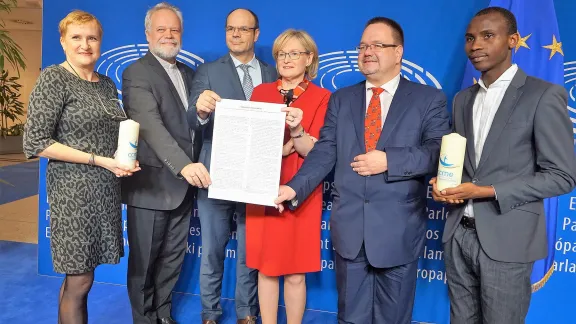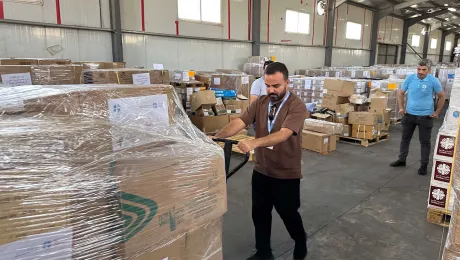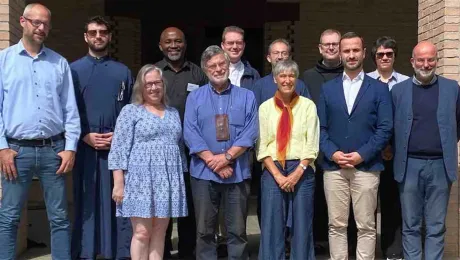
The CCME and CEC representatives presented the Christmas statement to First Vice-President of the European Parliament Mairead McGuinness in Brussels. Photo: CEC/Naveen Qayyum
LWF Vice-Presidents endorse document reaffirming asylum policy principles that protect human life
(LWI) - The Churches’ Commission for Migrants in Europe (CCME) has issued a statement calling on political leaders, churches and European citizens to work toward a more inclusive and welcoming society. The statement, published in the first week of Advent, urges all people to “recognize that welcoming the stranger is part of our Christian and European heritage.”
The Lutheran World Federation (LWF) Vice-Presidents for the three European regions and other LWF member church leaders are among the over 30 signatories to the declaration that has been endorsed by representatives of Anglican, Lutheran, Methodist, Orthodox, Reformed, and other Protestant churches, Christian World Communions and ecumenical organizations.
Leaders of the CCME and the Conference of European Churches (CEC) handed over the document to the 1st Vice President of the European Parliament, Mairead McGuinness, at a ceremony today in the parliament building in Brussels.
LWF Vice Presidents Estonian Archbishop Urmas Viilma (Central Eastern Europe), Germany’s Pröpstin Astrid Kleist (Central Western Europe) and Swedish Archbishop Dr Antje Jackelén (Nordic Countries), represent regions with churches that are members of both the LWF and CEC, and active in the work of CCME.
In their Christmas statement, the church leaders express “deep concern” about current developments in Europe’s response to new arrivals of migrants and refugees. According to United Nations’ statistics, almost 70 million people have been forced to flee their homes in search of sanctuary and livelihood. More than half of them are children.
In this season of Advent, the statement recalls how Jesus himself became homeless and took refuge in Egypt when Mary and Joseph fled from Herod’s threat to kill their child. “As we prepare to celebrate the birth of Christ,” it says, “we are reminded of our responsibility to those in need, along with God’s promise of light and life for this world.”
Dignity, respect and compassion
As well as recalling the biblical message of welcoming the stranger, the statement looks back to the 1999 European Summit in Tampere, Finland, and reiterates that “it is unacceptable that policies of ‘managing migration’ lead to situations where the massive loss of human life on the way to Europe has become normal, and exploitation and violence are an everyday reality.”
It is unacceptable that policies of ‘managing migration’ lead to situations where the massive loss of human life on the way to Europe has become normal, and exploitation and violence are an everyday reality.
The statement reaffirms the conclusions of that summit, in particular the “absolute respect of the right to seek asylum” and the “full and inclusive application of the Geneva Convention” as principles that must guide asylum policy today. The church representatives refute the notion that welcoming the newly arrived comes at the detriment of those presently living in Europe and insists that policies should address the needs of both migrants and inhabitants alike.
The church leaders stress that discussions on migration and refugees should be characterized by “dignity, respect and where possible compassion.” Spreading of “inaccurate, unverifiable and divisive messages only makes the challenge of living together more difficult,” they say.
The European church leaders insist that living together in diversity can be both enriching and challenging. They call for a spirit of tolerance and goodwill, together with a commitment to constructive engagement. They conclude by committing to work “towards our vision of an inclusive and participatory society – for newly arrived and all inhabitants.”


